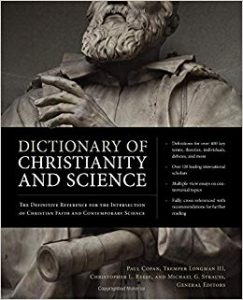Christopher L. Reese is a publishing professional, writer, and editor. He is an associate publisher at Lexham Press, and was previously an associate publisher at Moody Publishers and marketing manager for B&H Academic. Dr. Reese is also the co-author of the Dictionary of Christianity and Science.
Dr. Reese earned a Master of Divinity from Beeson Divinity School, and a Master of Theology (ThM) from Talbot School of Theology. He is also co-founder of the Christian Apologetics Alliance (christianapologeticsalliance.
7 Questions about Dictionary of Christianity and Science
 Recently, Dr. Reese graciously answered my questions about his new book. Readers will learn how the book came to be and how the project edified him personally.
Recently, Dr. Reese graciously answered my questions about his new book. Readers will learn how the book came to be and how the project edified him personally.
1. How was the idea for this dictionary born?
My friend Madison Trammel, an acquisitions editor at Zondervan Academic, conceived the idea, and asked me if I would be interested in participating. I was eager to, and Madison, the other three general editors, and I began mapping out the details–topics we thought should be covered, contributors, the timeline, and all the related details.
2. Who are the authors? How were they selected?
The general editors are Paul Copan, Tremper Longman, Michael Strauss, and me. Because discussions of Christianity and science cut across so many disciplines, we wanted general editors who brought expertise from some of the main fields, including philosophy, theology, biblical studies, and science. We also recruited about 140 contributors who work professionally in those areas, many of whom have previously written on topics related to Christianity and science.
3. Who is the intended audience for this dictionary? Would it benefit pastors? professors? students? lay Christians in the local church?
We tried to make the entries as accessible as we could for those coming to the topics for the first time. Each of the audiences you mention will find the Dictionary helpful in their own context. Pastors will find it useful for answering questions asked by church members, professors and students will find it beneficial for classroom use, and any believer who wrestles with issues related to science and faith will find helpful guidance.
4. What is unique about this dictionary? Why should Bible readers add it to their reference library?
Before the Dictionary, there wasn’t a single volume from an evangelical perspective that provided overviews of such a wide array of topics in the realm of Christianity and science. The Dictionary brings together some of the leading evangelical thinkers on these subjects along with some of the most up-to-date discussions.
For some of the more controversial topics, we also included a unique “counterpoint” format that provides two different perspectives on several issues, such as the age of the universe, Adam and Eve, interpretations of Genesis, and the relationship between theology and science. We tried to represent the most common evangelical approaches to these issues.
There are also three types of entries, with some giving brief overviews, others providing essay-length treatments, and a third that develops extended arguments that last for several pages. Each entry also concludes with a bibliography for further reading and study.
5. How has working on this project increased your affections for Christ? How would you anticipate it doing so for readers?
While working on this project over a period of five years, I gained an even greater appreciation for the beauty and complexity of God’s creation. Just as remarkable is the fact that human beings can comprehend it, which by itself is evidence for God’s existence, and our creation in his image.
I was also reminded that evangelicalism is a big tent whose members hold a variety of views on the relationship between science and Christianity. We hope the Dictionary exemplifies and will stimulate constructive dialogue on these issues, and that evangelicals will better understand one another and those who take different perspectives.
Own Christopher Reese’s book
The link provided will direct you to this volume via it’s exact ISBN number:
- Get Dr. Reese’s book at Amazon
- Get Dr. Reese’s book on Christian Book Distributors
Recent Posts
David Jeremiah, a renowned pastor, author, and speaker, has captivated the hearts of many with his compelling sermons. His messages resonate deeply with diverse audiences, leaving an enduring...
Tim Keller, a distinguished pastor, theologian, and author, has garnered a devoted following through the profound impact of his sermons. In this article, we will explore seven compelling reasons...
